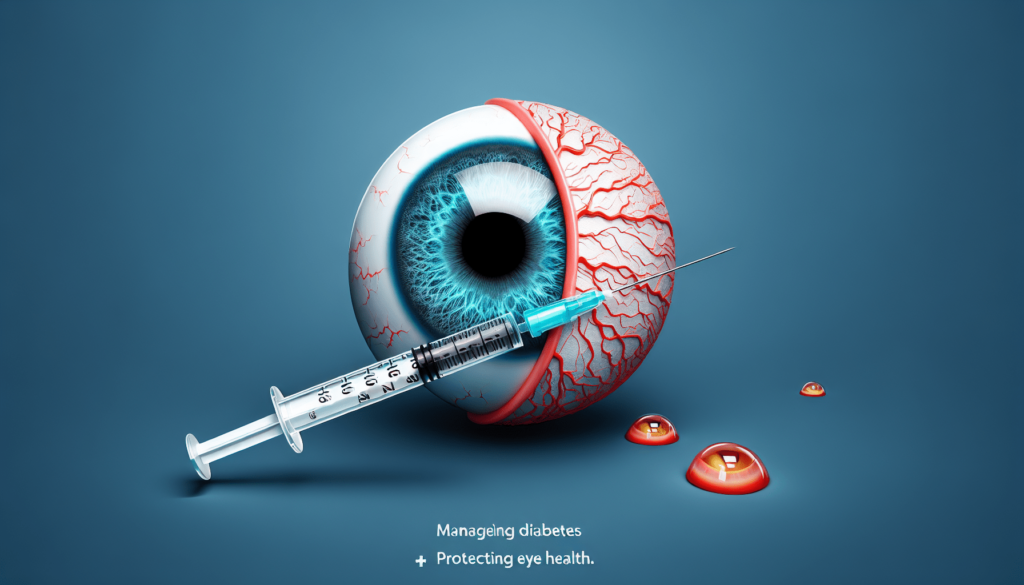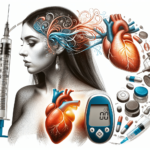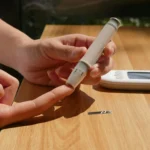Living with diabetes can present challenges, especially when it comes to managing one’s eye health. For women who struggle with diabetes, the concern over potential complications like diabetic retinopathy looms large. Understanding the importance of proactive measures and regular check-ups can go a long way in safeguarding one’s vision. By staying informed and taking the necessary precautions, you can effectively manage diabetes and protect your eye health.
In This Article
ToggleUnderstanding Diabetes
Overview of diabetes
Diabetes is a chronic condition that affects millions of people worldwide. It is characterized by high levels of glucose (sugar) in the blood, leading to a variety of health complications. The body requires insulin, a hormone produced by the pancreas, to regulate blood sugar levels. In people with diabetes, their body either does not produce enough insulin or does not use it effectively. As a result, glucose builds up in the bloodstream, causing hyperglycemia.
Types of diabetes
There are several types of diabetes, with the most common being type 1 and type 2 diabetes.
Type 1 diabetes
Type 1 diabetes is an autoimmune disease where the body’s immune system mistakenly attacks the insulin-producing cells in the pancreas. This condition usually develops in childhood or early adulthood, and individuals with type 1 diabetes require insulin injections or the use of an insulin pump to manage their blood sugar levels.
Type 2 diabetes
Type 2 diabetes is the most prevalent form of diabetes. It occurs when the body becomes resistant to the effects of insulin or does not produce enough insulin to maintain normal blood sugar levels. This type of diabetes can be managed through lifestyle changes such as healthy eating, regular exercise, and, in some cases, medication or insulin therapy.
Complications associated with diabetes
Untreated or poorly managed diabetes can lead to a range of complications, including those that affect the eyes. Diabetic retinopathy, the most common eye complication related to diabetes, can ultimately cause vision loss or blindness if left untreated. Other complications include neuropathy (nerve damage), nephropathy (kidney damage), and cardiovascular disease. It is crucial to manage diabetes effectively to prevent or minimize the risk of these complications.
Diabetic Retinopathy: An Overview
Introduction to diabetic retinopathy
Diabetic retinopathy is a condition that affects the blood vessels in the retina, the light-sensitive tissue at the back of the eye. High levels of blood sugar can damage the small blood vessels, causing them to leak or become blocked. As a result, the retina does not receive adequate blood supply, leading to vision problems.
Causes and risk factors
The exact cause of diabetic retinopathy is still not fully understood. However, it is known that chronically high blood sugar levels play a significant role in its development. Other risk factors include the duration of diabetes, high blood pressure, high cholesterol, pregnancy, and smoking.
Symptoms and diagnosis
In the early stages, diabetic retinopathy may not cause any noticeable symptoms. However, as the condition progresses, symptoms such as blurred vision, floaters, difficulty seeing at night, and fluctuating vision may occur. Regular eye examinations are crucial for the early detection and diagnosis of diabetic retinopathy. Eye care professionals can perform various tests, including a dilated eye exam, to assess the health of the retina and identify any signs of retinopathy.
Progression and stages of diabetic retinopathy
Diabetic retinopathy can be categorized into different stages, ranging from mild to severe. At the initial stage, known as non-proliferative diabetic retinopathy (NPDR), there may be no visible symptoms, but microaneurysms and small hemorrhages can be seen in the retina. As the condition progresses, blood vessels may become blocked, and new abnormal blood vessels may start to form. This advanced stage is called proliferative diabetic retinopathy (PDR), and it poses a higher risk of vision loss.

This image is property of images.pexels.com.
Importance of Managing Diabetes
Maintaining blood sugar levels
One of the most crucial aspects of managing diabetes is maintaining stable blood sugar levels. By keeping your blood sugar within a target range suggested by your healthcare provider, you can help reduce the risk of diabetic retinopathy and other complications. This can be achieved through a combination of regular blood sugar monitoring, following a well-balanced diet, taking prescribed medications as directed, and incorporating physical activity into your daily routine.
Adopting a healthy lifestyle
Living a healthy lifestyle is vital for managing diabetes effectively. This includes eating a nutritious diet that focuses on whole foods, fruits, vegetables, lean proteins, and whole grains. Avoiding excessive consumption of sugary and processed foods can help control blood sugar levels and promote overall well-being. Regular exercise is also beneficial for managing diabetes as it helps improve insulin sensitivity, weight management, and cardiovascular health.
Regular medical check-ups
Regular medical check-ups are essential for monitoring the progression of diabetes and detecting any potential complications early on. Routine visits to your healthcare provider allow for comprehensive assessments of your blood sugar levels, blood pressure, cholesterol levels, and overall health status. By addressing any changes or concerns promptly, you can work together with your healthcare team to adjust your treatment plan and maintain optimal diabetes management.
Managing other risk factors
In addition to blood sugar control, managing other risk factors associated with diabetes is crucial for overall health and the prevention of complications such as diabetic retinopathy. These risk factors include maintaining healthy blood pressure levels, managing cholesterol, refraining from smoking, and, if applicable, managing pregnancy-related conditions. By addressing these factors, you can reduce the likelihood of developing diabetic retinopathy and other diabetes-related complications.
Preventing Diabetic Retinopathy
Controlling blood sugar levels
Maintaining stable blood sugar levels is essential for preventing or delaying the onset of diabetic retinopathy. Regular monitoring of blood sugar and following a personalized diabetes management plan can help ensure that your levels are within the target range recommended by your healthcare provider. Monitoring may involve the use of a blood glucose meter, continuous glucose monitoring system, or other diabetes monitoring devices.
Managing blood pressure and cholesterol levels
High blood pressure and cholesterol levels are additional risk factors for diabetic retinopathy. It is important to work with your healthcare team to maintain healthy levels of both. Regular check-ups, adherence to prescribed medications, lifestyle modifications, and dietary adjustments can help keep these factors under control, reducing the risk of complications.
Maintaining a healthy diet
A well-balanced and nutritious diet is key to preventing diabetic retinopathy and promoting overall eye health. Eating foods that are rich in nutrients, vitamins, and antioxidants can help protect the blood vessels in your eyes and reduce the risk of damage. Incorporating foods such as dark leafy greens, fruits, fish, nuts, and whole grains into your diet can provide the essential nutrients needed for optimal eye health.
Regular physical activity
Engaging in regular physical activity offers numerous health benefits, including the prevention of diabetic retinopathy. Exercise helps to control blood sugar levels, improve circulation, maintain a healthy weight, and reduce the risk of cardiovascular disease. Aim for at least 150 minutes of moderate-intensity aerobic activity, such as brisk walking, per week, or consult with your healthcare provider for personalized recommendations.
Quitting smoking
Smoking significantly increases the risk of developing diabetic retinopathy and other diabetes-related complications. Tobacco smoke contains harmful chemicals that can damage blood vessels, impair blood circulation, and increase inflammation throughout the body. Quitting smoking is challenging but essential for overall health and the prevention of diabetic retinopathy. Seek support from healthcare professionals, join smoking cessation programs, and explore nicotine replacement therapies to help you quit successfully.
Monitoring and managing blood glucose
Regular monitoring of blood glucose levels is crucial in preventing diabetic retinopathy. Adhering to your recommended monitoring schedule and accurately recording your results can provide valuable information for effective diabetes management. Your healthcare provider can guide you on how often to monitor and interpret the results, helping you make informed decisions about lifestyle adjustments and medication management.

This image is property of images.pexels.com.
Developing an Eye Care Routine
Regular eye examinations
Regular eye examinations play a pivotal role in preserving eye health and detecting any changes associated with diabetic retinopathy. For individuals with diabetes, it is recommended to have a comprehensive eye examination at least once a year, or as advised by your eye care professional. These exams may include visual acuity tests, dilated eye exams, intraocular pressure measurement, and assessment of the retina and optic nerve. Early detection and treatment of diabetic retinopathy can greatly improve outcomes and help prevent vision loss.
Importance of early detection
Early detection of diabetic retinopathy is vital for successful management and treatment. Monitoring your symptoms and recognizing any changes in your vision is crucial. However, it is important to note that in the early stages, diabetic retinopathy may not cause noticeable symptoms. Regular eye examinations allow eye care professionals to use specialized tools and techniques to assess the condition of your eyes and identify any signs of retinopathy, even before noticeable symptoms occur.
Working with an eye care professional
Collaborating with an experienced eye care professional is essential for maintaining eye health and managing diabetic retinopathy. These professionals, such as ophthalmologists or optometrists, have the knowledge and expertise to assess your eye health, diagnose retinopathy, and provide appropriate treatment and management strategies. They can also offer guidance on preventive measures, lifestyle modifications, and referrals to other healthcare providers if necessary.
Understanding treatment options for diabetic retinopathy
If diabetic retinopathy is detected, various treatment options may be recommended depending on the stage and severity of the condition. Treatments can include laser therapy, injections of medication into the eye (intravitreal injections), or surgery. These interventions aim to slow down the progression of retinopathy, reduce the risk of vision loss, and, in some cases, improve vision. Your eye care professional will determine the most suitable treatment plan based on your individual circumstances.
Technology and Tools for Managing Diabetes
Diabetes monitoring devices
Technological advancements have greatly improved the management of diabetes. Diabetes monitoring devices, such as blood glucose meters and continuous glucose monitoring (CGM) systems, provide accurate readings of blood sugar levels. These devices allow individuals with diabetes to conveniently and regularly monitor their blood sugar, enabling them to make informed decisions about their diet, medication, and lifestyle choices.
Blood glucose meters
Blood glucose meters are portable devices that allow individuals with diabetes to measure their blood sugar levels at any time. By pricking their finger and applying a small blood sample to a test strip, the meter provides a reading of their current blood sugar level. This information is essential for monitoring and adjusting their daily diabetes management routine.
Continuous glucose monitoring systems
Continuous glucose monitoring (CGM) systems offer real-time visibility into blood sugar levels throughout the day and night. These systems use a small sensor inserted under the skin to continuously measure glucose levels in the interstitial fluid. This data is then transmitted wirelessly to a receiver or smartphone, providing up-to-date information about blood sugar trends, patterns, and alerts for high or low glucose levels.
Insulin pumps and pens
Insulin pumps and pens are devices used by individuals with type 1 diabetes or some individuals with type 2 diabetes to deliver insulin. Insulin pumps are small computerized devices that deliver a consistent supply of insulin throughout the day, eliminating the need for multiple daily injections. Insulin pens, on the other hand, are portable devices that allow for the convenient and precise administration of insulin using disposable pen needles.
Mobile apps and digital tools for diabetes management
Mobile apps and digital tools have emerged as valuable resources for managing diabetes and promoting self-care. These apps offer features such as blood glucose tracking, medication reminders, food and exercise logging, educational resources, and remote monitoring capabilities. They provide a user-friendly and accessible platform for individuals with diabetes to manage their condition, maintain records, and gain insights into their health patterns.

This image is property of images.pexels.com.
Support Systems for Diabetic Individuals
Diabetes education and self-management programs
Diabetes education and self-management programs play a vital role in empowering individuals to take control of their diabetes and make informed decisions regarding their health. These programs provide valuable information on topics such as blood glucose monitoring, medication management, healthy eating, physical activity, and coping with the emotional aspects of living with diabetes. By participating in these programs, individuals with diabetes can gain knowledge, skills, and confidence in managing their condition effectively.
Counseling and support groups
Counseling services and support groups can serve as valuable emotional and psychological resources for individuals with diabetes. Living with a chronic condition like diabetes can be challenging, and it is normal to experience emotional stress, anxiety, and even depression. Professional counseling can provide individuals with coping strategies, stress management techniques, and a safe space to discuss their concerns and challenges. Additionally, joining support groups can offer a sense of community, understanding, and shared experiences with others facing similar health journeys.
Peer support and online communities
Peer support and online communities provide individuals with diabetes an opportunity to connect with others who share similar experiences and challenges. These communities can serve as platforms for sharing information, seeking advice, finding inspiration, and offering support. Engaging with peers can help individuals feel less alone and provide encouragement, motivation, and insights into managing diabetes effectively.
Family and caregiver involvement
Family and caregiver involvement play a crucial role in the support and management of diabetes. Building a strong support network within your immediate family or circle of caregivers ensures that you have assistance and understanding when needed. They can help with tasks such as medication management, meal planning, and encouraging healthy lifestyle choices. Open communication and education about diabetes can foster empathy, collaboration, and shared responsibility for successful diabetes management.
Educating Yourself About Diabetes and Eye Health
Understanding the relationship between diabetes and eye health
Understanding the relationship between diabetes and eye health is essential for individuals with diabetes to take proactive measures to protect their vision. High blood sugar levels in diabetes can affect the small blood vessels in the eyes, leading to diabetic retinopathy and other eye complications. By educating yourself about the impact of diabetes on your eyes and the importance of regular eye examinations, you can prioritize eye health as an integral part of your overall diabetes management plan.
Learning about diabetic retinopathy
Learning about diabetic retinopathy helps individuals understand the condition, its progression, and the potential impact on vision. Familiarizing yourself with the symptoms, risk factors, and treatment options for diabetic retinopathy enables you to recognize any changes in your eye health and seek timely medical attention. Utilize trustworthy sources, such as reputable medical websites, educational materials, and information provided by healthcare professionals, to educate yourself about this eye complication.
Accessing reliable sources of information
Reliable sources of information are crucial for accurate and up-to-date knowledge about diabetes and eye health. Seek information from reputable organizations, medical journals, and healthcare professionals specialized in diabetes and ophthalmology. These sources provide evidence-based information, guidelines, and recommendations to help you make informed decisions about your health. Avoid relying solely on anecdotal or unverified information, as it may not be accurate or appropriate for your individual circumstances.
Seeking guidance from healthcare professionals
Seeking guidance from healthcare professionals is essential for comprehensive diabetes management and eye health. Diabetes healthcare providers, such as endocrinologists, primary care physicians, and diabetes educators, can offer personalized advice, treatment plans, and referrals to eye care professionals. Ophthalmologists or optometrists are specialists who can assess and manage your eye health, provide early detection of retinopathy, and administer appropriate treatments if necessary. Working collaboratively with these professionals ensures a holistic approach to your health and well-being.

Taking Action: Lifestyle Changes and Habits
Making dietary adjustments
Making dietary adjustments is a proactive step in managing diabetes and protecting your eye health. Focus on consuming a well-balanced diet that includes a variety of nutrient-rich foods. Incorporate whole grains, fruits, vegetables, lean proteins, and healthy fats into your meals. Limit the intake of sugary, processed, and high-sodium foods. Portion control and mindful eating can also be beneficial in maintaining stable blood sugar levels and supporting overall health.
Incorporating exercise into daily routine
Regular physical activity is a cornerstone of diabetes management and overall well-being. Engaging in moderate-intensity aerobic exercises, such as brisk walking, cycling, swimming, or dancing, helps improve insulin sensitivity, control blood sugar levels, reduce weight, and promote cardiovascular health. Aim for at least 150 minutes of exercise per week and consider incorporating strength training exercises to build muscle mass and enhance metabolism.
Quitting smoking and minimizing alcohol consumption
Smoking and excessive alcohol consumption can have detrimental effects on your health, especially when combined with diabetes. Smoking increases the risk of developing diabetic retinopathy and other complications, while alcohol can interfere with blood sugar control and increase the risk of hypoglycemia. Quitting smoking and limiting alcohol intake are critical steps in protecting your overall health, including your eye health.
Developing stress management techniques
Chronic stress can negatively impact blood sugar levels and overall well-being. Developing effective stress management techniques is crucial for individuals with diabetes. Consider incorporating activities such as meditation, deep breathing exercises, yoga, or engaging in hobbies that promote relaxation and emotional well-being. Additionally, prioritize self-care and ensure you have adequate sleep and downtime to recharge and manage stress levels effectively.
Emotional and Mental Well-being
Managing stress and anxiety
Managing stress and anxiety is vital for emotional and mental well-being when living with diabetes. Chronic stress can impact blood sugar levels and make diabetes management more challenging. Adopt stress management techniques, such as mindfulness practices, relaxation exercises, or seeking professional counseling or therapy when needed. Taking care of your mental health can positively influence your overall diabetes management.
Seeking emotional support
Emotional support plays a significant role in managing diabetes and protecting your mental well-being. Lean on trusted friends, family members, or support networks to share your concerns, frustrations, and triumphs. Consider joining support groups or online communities specifically focused on diabetes to connect with others who understand your experiences. If necessary, seek professional help from therapists or counselors specializing in diabetes-related emotional support.
Maintaining a positive outlook
Maintaining a positive outlook can be a powerful tool in managing diabetes and promoting overall well-being. While living with a chronic condition may bring challenges, focusing on the progress you have made, celebrating achievements, and embracing a resilient mindset can help you navigate the ups and downs. Surround yourself with a positive support system and engage in activities that bring joy, purpose, and fulfillment into your life.
Taking care of overall mental health
Taking care of your overall mental health is crucial when living with diabetes. Diabetes management can bring emotional burdens, and it is important to prioritize your mental well-being. Engage in activities that promote relaxation, practice self-compassion and self-care, and seek professional help if you notice persistent feelings of anxiety, depression, or difficulty coping with the demands of diabetes. Prioritize mental health as an essential component of your overall diabetes management plan.
By understanding diabetes, recognizing the importance of managing the condition, and taking proactive steps to protect your eye health, you can lead a fulfilling and healthy life while effectively managing diabetes. Educate yourself, work closely with your healthcare team, and make positive lifestyle choices to optimize your overall well-being and maintain optimal vision. Remember, you are not alone in your diabetes journey, and there are numerous resources and support systems available to help you navigate this path towards a healthier future.

















No comment yet, add your voice below!